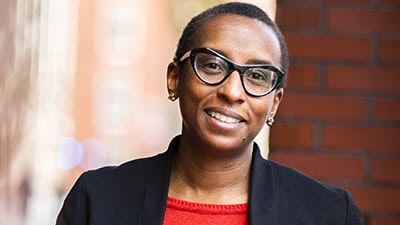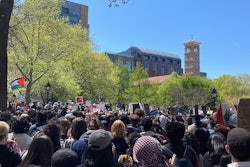In the wake of Dr. Claudine Gay's resignation as president of Harvard earlier this week, higher education scholars have forcefully responded to her forced ouster, arguing that she was clearly targeted as the first Black woman to lead the nation's oldest university.
Across social media and on cable talk shows, many seem to view Gay’s persecution and resignation as emblematic of the targeting of higher ed and minority presidents by some conservatives. And in an era where bans books are being banned and affirmative action dismantled, their suspicions are rightfully justified.
"I think this is a sign of governmental overreach into the autonomy of higher education,” said Dr. Lynn Pasquerella, president of the American Association of Colleges and Universities (AAC&U), of which Harvard is a member. She said that she was saddened but not surprised by Gay's resignation. “The escalating culture wars have included a targeted attack on higher education by those who view college campuses as bastions of liberal progressivism." Dr. Claudine Gay
Dr. Claudine Gay
The intense scrutiny Gay was put under for her responses during a Congressional hearing on antisemitism in early December and her alleged plagiarism was demonstrative of governmental intrusion and a political attack against diversity, equity, and inclusion (DEI) on campuses, scholars and education observers have lamented.
Pasquerella said Gay’s comments during the congressional hearing were “missteps” but urged people to examine the larger political context and motivations behind the hearing.
During that hearing, House GOP Conference Chair Elise Stefanik, an ardent Trump supporter, aggressively questioned Gay and the presidents of MIT and the University of Pennsylvania about whether calls for “the genocide of Jews” would constitute conduct violations on campus.
“At Harvard, does calling for the genocide of Jews violate Harvard's rules of bullying and harassment? Yes or no." Stefanik asked.
“It can be, depending on the context,” Gay responded. “Antisemitic rhetoric, when it crosses into conduct and amounts to bullying, harassment, intimidation, that is actionable conduct and we do take action.”
In the aftermath of the hearing, Gay later clarified her position.
“Let me be clear: Calls for violence or genocide against the Jewish community, or any religious or ethnic group are vile, they have no place at Harvard, and those who threaten our Jewish students will be held to account,” Gay wrote in a Dec. 6 statement.
In addition to that criticism, Gay’s academic legitimacy and credibility has also been called into question, with conservative activists pointing to multiple cases of alleged plagiarism in Gay’s 1997 doctoral dissertation. After reviewing her work, Harvard’s governing board said that Gay would update her dissertation and request corrections but was quick to point out that the errors were minor.
Gay’s resignation came weeks after the University of Pennsylvania's President Liz Magill and Penn Trustee Chairman Scott Bok stepped down from their posts on Dec. 9.
Gay’s answers during that Congressional hearing were most likely prepared and drafted by the school's legal counsel, and responsibility for those answers should not just fall solely on Gay, argued Dr. Jorge Burmicky, an assistant professor of higher education leadership and policy studies at Howard University.
“I'm by no means saying that I'm defending the answers." he said. "But I do want to say that this is representative of an institution."
More should’ve been done by Harvard to defend Gay and the school’s own autonomy, said Dr. Anthony Abraham Jack, an associate professor of higher education leadership at Boston University.
"You cannot read this without understanding the layers of sexism, racism, and misogyny from the get-go,” Jack said. “And Claudine was at the center of all of that by being a brilliant Black woman who was at Harvard."
Not having Gay around in a leadership post on campus is also bound to affect how students of color feel in terms of having a reduced sense of welcome and belonging, Pasquerella said. And what happened to Gay may stoke the fears of faculty of color about being disposable in academia, said Dr. Maia Hoskin, an assistant professor at Loyola Marymount University.
Still, the targeting of minoritized leaders like Gay is hardly new, Burmicky added.
"People know that you're the first person of color to assume the position, so they want to look for something," he said. "We know that this type of pushback will always happen."
Dr. Frank Fernandez, an assistant professor of higher education administration and policy at the University of Florida, predicted that Gay’s persecution and resignation may lead to more hesitancy amongst both women and minorities to pursue similar leadership roles.
"The hearings in Congress were never meant to be [about having discourse]. It was trying to set up "gotcha moments," Fernandez said. “And then [conservative activist Christopher Rufo] going back and [trying to] scour everything that this woman has ever written to try to find a way to delegitimatize her. Who wants to take that on?"
Rufo – along with other conservatives – has celebrated Gay’s stepping down and told POLITICO that her resignation was a result of a coordinated “successful strategy for the political right.”
"Anyone that's working in higher ed sees firsthand and understands the challenges that our colleagues of color have to deal with,” said Dr. Irene Mulvey, president of the American Association of University Professors (AAUP). “And to see this play out so publicly is to just see that kind of unfairness as clear as day.”
The role of college presidents will get harder as the mission of higher ed face skepticism, said Dr. Karen A. Stout, president and CEO of Achieving the Dream, an organization that works to close achievement gaps and accelerate student success nationwide. Schools, she said, need to find more ways to support presidents through this kind of complexity.
Dr. Ted Mitchell, president of the American Council on Education (ACE) agrees.
“The pressures of the presidency have been increasing steadily for some time," he said. "The influx of external politics on public institutions has always been there but not to this extent. Now we see presidents being put under a political spotlight in addition to what was already a 24/7 job, that requires presidents to be on all the time and have skills in many different areas.”
Dr. Demetri Morgan, an associate professor of higher education at Loyola University Chicago, said that while Gay’s situation may not improve conditions for minorities in higher ed, he's not convinced they will be made worse by it either.
He said that Harvard is an often-inaccessible elite institution for many minoritized people, and Gay – despite her resignation – will remain part of it as faculty. The happenings at elite institutions will not mean much for the “average minoritized person in terms of material impacts to our day to day and semester to semester experiences,” he said, given that bad things happen to women of color on campuses all the time.
“Yet the vast majority of us will find ways to achieve and be successful in spite of things - just like Dr. Gay has and will likely continue to do,” Morgan added.





















